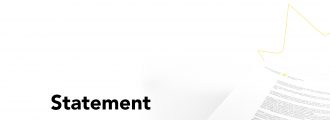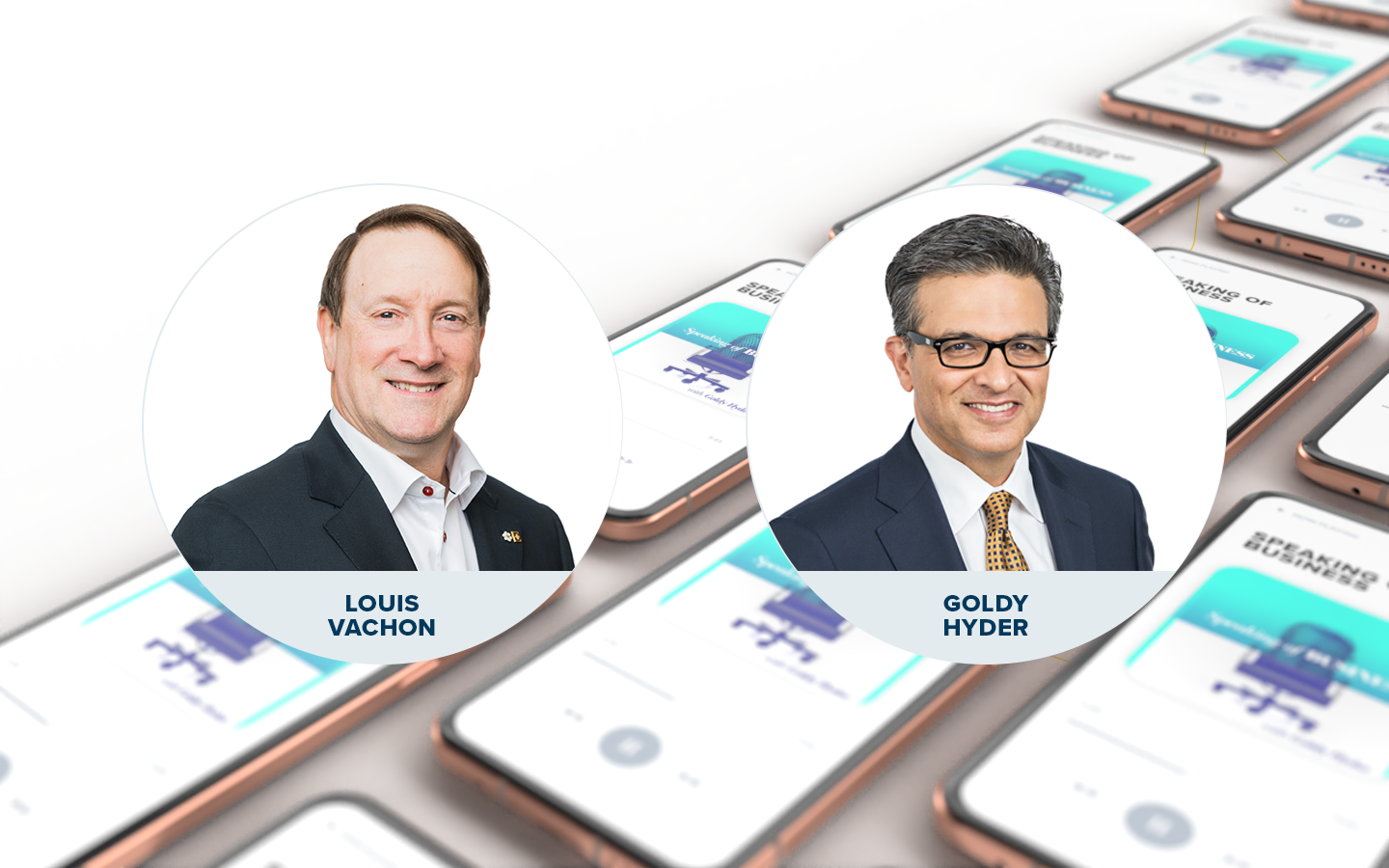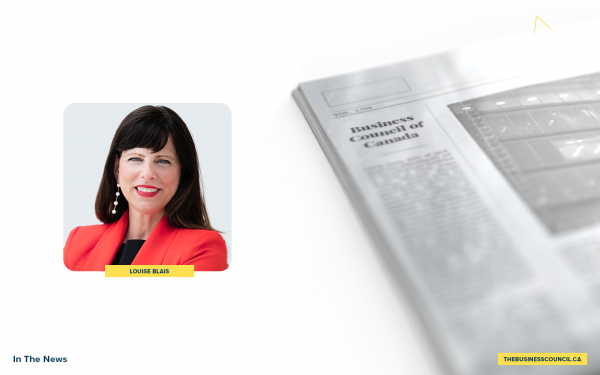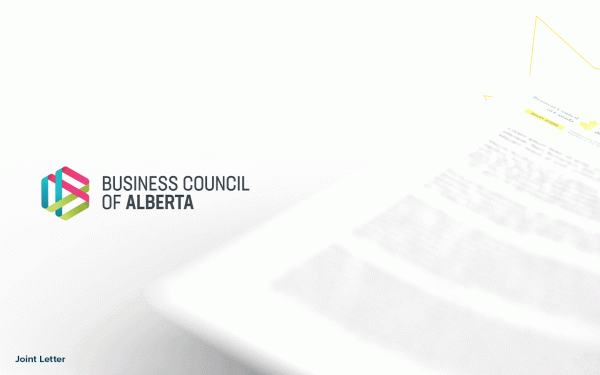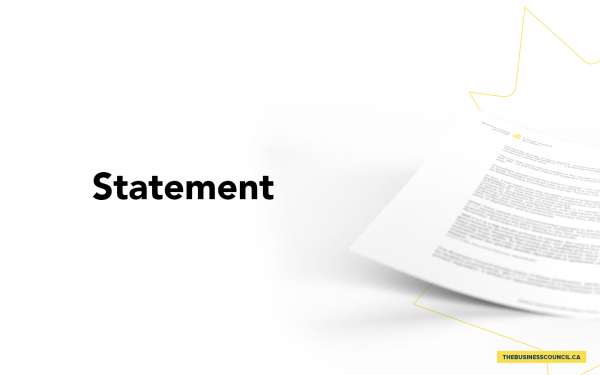Louis Vachon on leadership, transformation, and the central role of the economy
Canada needs a strong economy to help it address significant post-COVID challenges, says the outgoing CEO of National Bank of Canada, Louis Vachon.
In a conversation with Goldy Hyder in the Speaking of Business podcast, Vachon says Canada is facing four areas of transformation: technology, demographics, geopolitics and climate change.
Connecting them all, he says, is “clearly the economy … you need to get it absolutely right, and fast.”
Vachon retired from National Bank of Canada on October 31, following almost 15 years at the helm.
After navigating many challenges, including the 2008 financial crisis, he says he hopes he leaves behind an employee culture that is able to adapt to change. “I kept saying to my employees ‘as a CEO, the only thing I can promise you is more change.’”
Listen to Louis Vachon’s full conversation with Goldy Hyder.
Latest Podcasts
Transcript:
Louis Vachon:
To lead is to choose. You have to make decisions and you cannot be paralyzed by uncertainty, you cannot be paralyzed by the fear, you have to get through this.
Goldy Hyder:
Welcome to Speaking of Business, conversations with Canadian innovators, entrepreneurs and business leaders. I’m Goldy Hyder , president and CEO of The Business Council of Canada. I don’t need to tell you that we are at a pivotal moment in the life of this country. We all hope that the worst of the COVID-19 pandemic is now behind us. What lies ahead though, is equally daunting. The cost of living is going up, along with the national debt, at the same time, we’re dealing with supply and labor shortages. And let’s not forget, the long standing challenges we face, including the threat of climate change, rising inequality and the ongoing need for meaningful Indigenous reconciliation. How do we, as a country, chart a path forward? Louis Vachon can offer a long view. For almost 15 years, he has been president and CEO of National Bank of Canada. He retired at the end of October and I had a chance to speak with him just days before, on the 26th, it was the day that cabinet was being sworn in. What has he learned and where does he see Canada going? Welcome to the podcast, Louis.
Louis Vachon:
Thank you for the invitation.
Goldy Hyder:
Well, let’s start with where we are here and now, what’s your assessment of the current state of the economy, on the day that we’re about to hear who is in cabinet?
Louis Vachon:
Well, listen, I think we’re going through a period of time, which is pretty unique, in the sense that, we’re having major, major secular transformations, at the same time that we’re dealing with the pandemic, once in a hundred year type of event. So, it is complex, it’s fast moving and it will require a lot of leadership. So, good luck to that cabinet.
Goldy Hyder:
So, if you were, let’s say, hypothetically, you’re the clerk of that cabinet, you’re meeting for the first time. What would you say to them if they asked you, Mr. Clerk, what is the biggest challenge facing Canada right now?
Louis Vachon:
Biggest challenge is navigating all that change. Navigating the secular trends of technology change, demographics, climate change. And as if it were not enough of three, over the last few years, we’ve had geopolitical change coming to the forefront. So, we have four major secular transformations going on in the economy and on top of that, we have COVID. So, I don’t want to quote the Clinton administration or quote the Clinton campaign back in the old days but it is clearly the economy, I think, is the key one. Because I think it interconnects with the economy, it interconnects with social justice, it interconnects with climate. So, it is, you need to get it absolutely right and fast.
Goldy Hyder:
Now, this isn’t your first rodeo when it comes to a crisis, you were, in your course of your tenure there, you certainly had to deal with the fiscal crisis back in 2008. And I’ve read some of your thoughts on how you managed that crisis. Why don’t you tell us about that experience, first of all, the financial crisis itself, what did it teach you early in career, as a CEO of the bank, in terms of how do leaders lead in crisis?
Louis Vachon:
I think, first of all, what has helped me in crisis and outside of crisis has been a pretty good level and that’s not self-proclaimed but that’s what – feedback. A pretty good level of authenticity. I say things as they are. Authenticity is harder and harder today because there’s a school of thought and certainly a school of communication is, you need to be extremely careful and you’re trying to please everybody when you communicate, even when you’re making choices. And I think that’s mission impossible and you end up being ineffectual and not authentic. So, first of all, I think authenticity was very helpful. Courage, I think, at the end of the day. To lead is to choose. You have to make decisions and you cannot be paralyzed by uncertainty, you cannot be paralyzed by the fear, you have to get through this. Communication is key. The big difference between Louis Vachon in 2008 and Louis Vachon in 2020 was, the level of communication with the employees was exponentially higher in 2020.
Louis Vachon:
Yes, the circumstances are different, a sanitary crisis is quite different than a financial one but also from experience, I felt that I undercommunicated, in 2008, with the employees and also with the broader stakeholders that we have and we communicate a lot more. The other thing too is, that we’ve learned is, a crisis can be an opportunity. No, it’s not a cliche, it’s true. And for me coming in, in ’07, ’08, it did allow me to put in place an agenda for change. We launched the one client one bank transformation, in the fall of 2008 and we had that debate, whether we should launch a transformation in the middle of the worst financial crisis of the last 75 years and we did so. And I think that was absolutely the right decision because it focused the organization, not just on the short-term, it focused the organization on the medium and long-term.
Goldy Hyder:
So, I’m guessing, given that experience, that the pandemic itself, while obviously a very unfortunate event, is something that, at the bank, that you under your leadership are doing the exact same thing. You’re looking at how you can use this as a catalyst for change. So, what are you doing at the bank?
Louis Vachon:
A couple things have helped us beforehand. So, one of the things that was part of one client, one bank, was a culture adapted to change. I’ve been repeating over and over again, this mantra that, what I want to leave behind is a culture adapted to change. Because I kept saying to my employees, as a CEO, guys, the only thing I can promise you is more change. Look at what’s going on with technology, demographics, climate, it’s more change. So, we have put a lot of emphasis on this and we had defined what an organization adapted to change is. So, when the crisis hit, I think our agility was, I think, was already well prepared, we were in a good position to do this. So, very quickly, our technology was allowing us to work remotely. Was that vision? No. It was called, what helped us a lot are the snowstorms. In January of 2020, we had a massive snowstorm in Montreal and we had 9,000 employees working at home on a VPN.
Louis Vachon:
So, when we had to go and move most people on distance, who were working remotely in March, we had to add three or 4,000 capabilities. So, we had the technology, we just got bigger pipes from our internet providers. So, that was one big element. The other one is the balance of the stakeholders, that is one of the key things. And yes, we are focused on the shareholders and yes, that has given very good results, we’re very happy about our performance, but we’ve never lost sight of our employees, we never lost sight, obviously, of the clients and we never lost sight of society, as a whole. So, our KPIs, our key performance indicators, our discussion with the board, always look at the balanced scorecard of a balance of the stakeholders. And, again, when you hit a crisis, that is a good guiding principle because you don’t start going around and getting obsessed with one of the stakeholders, you need to keep balance on the stakeholders.
Louis Vachon:
What does that mean for the employees? How do we protect the employees? And very quickly, we move also, what does it mean for our clients? And that’s when, with the industry, we put in place measures to defer payments, so that it gave a breather to tens of thousands of businesses in the country and millions of citizens, got a breather financially for the first few months of the pandemic.
Goldy Hyder:
I read that you had said that, an adaptable organization is able to absorb shocks.
Louis Vachon:
Yeah.
Goldy Hyder:
And you went on to say that, resilience, resilience, in and of itself, is insufficient. What did you mean by that?
Louis Vachon:
When I talk about an adaptable organization, I talk about redundancy a lot and that’s inspired by mother nature. That famous book, “Learning from the Octopus,” from Rafe Sagarin, who looked at mother nature and said, who are the organisms who are adaptable? And what does that mean for organizations? What can organizations learn from mother nature, in terms of adaptability? And redundancy is one of these things. The point I was making about resilience versus adaptability is, resilience is unfortunately becoming more and more a bureaucratic mantra. We want to be resilient and that means, we can absorb shock and that’s fine but if it’s not well managed, it will lead to waste, it will lead to protectionism and it will lead to bad decisions.
Louis Vachon:
And my definition of resilience is, you go along, there’s a crisis, you absorb the crisis and you go back to the status quo. Adaptability is different, you go along, there’s a crisis, you absorb the crisis and you revert back to a new reality, not to the status quo. And that’s a big difference. So, that’s why I say, I am more about adaptability for organizations, ideally, for the country, than just resilience because resilience can lead to a very bureaucratic and wasteful view of the world.
Goldy Hyder:
Sticking with the theme of leadership, you gave, probably, one of the most comprehensive but succinct answers I’ve heard on the question of the characteristics of leadership, right? The importance of authenticity, the importance to be honest and lead change, to engage with your shareholders and stakeholders and, frankly, the importance of communications. I’m wondering if you could give yourself advice, 14 years ago, what would you have said to yourself back then, that you know now that you didn’t know back then?
Louis Vachon:
So, what’s different than Louis circa 2021 versus Louis circa 2007, more patience. Psychological patience and strategic patience. Yes, call to action but you can breathe for five seconds before giving an answer, that’s okay.
Goldy Hyder:
Are you giving me a performance review right now?
Louis Vachon:
Yeah. So, listen, I’m not the only one like this but that’s okay. But I’d rather have people that have to hold back than somebody I need to push in the rear-end, as partners. So, I think patience has been a thing, quite important, that I’ve learned over time. What’s the real meaning of diversity? How do you approach diversity? How do you work diversity? How do you learn diversity? How do you apply diversity? How do you make mistakes in diversity? That whole thing that’s been a long trending road and no, we’re not at Nirvana yet but I think we’ve progressed a lot. And so, that’s been certainly learning mechanisms.
Goldy Hyder:
You mentioned mistakes. If there’s been a theme that’s come out in a lot of our podcasts, with your colleagues and counterparts across the country, it’s the role of failure in becoming a successful leader. Do you agree with that?
Louis Vachon:
Absolutely. And that’s why, one of the key things, when I describe an adaptable organization, I call it, one of first characteristics is a learning organization and it refers to two things. One, the importance of training and learning constantly as an organization. The second one, which is just as important, is learning from mistakes. And what we’ve done at the bank is, we’ve institutionalized that, we call that lessons learned exercises.
Goldy Hyder:
How do you do that?
Louis Vachon:
When we screw up, we make a mistake or, ideally, one of our competitors makes a mistake, that’s less painful and –
Goldy Hyder:
I assume that’s preferred.
Louis Vachon:
Yes. But it’s in both cases. There are two levels, we discuss, at the executive committee and we discuss at the global risk committee of the board. And sometimes, some of these lessons, if they’re strategic in nature, go and are discussed at the full board level. So, we call that lessons learned exercise and we see our mistakes, bad deals, we learn, lost money, this, that or we see an issue at other places, we say, okay, can it occur at National Bank? What have we done? Have we done anything to prevent that from occurring at our place? We try to make it more systematic and learning constantly from this. It’s okay to make mistakes, don’t make the same mistakes two or three times over.
Goldy Hyder:
Exactly. Well, that’s a good lesson for our listeners, especially those who are still in business school or other programs. Let’s dig and, sort of, dive into some of the policy things, because I know you to be one of those CEOs who cares deeply about public policy and the role that public policy plays in our society and the intersection between business and government is an important one. Let’s start with, what are the issues you care most about? What are the public policy issues that you just get, like, this is what I want to have a role in.
Louis Vachon:
Well, there are a number of. One that I stumbled into has been cybersecurity. And, again, in 2007, cybersecurity would not have made my top five list of priorities or concerns or stuff that keeps me up at night. But given the technology evolution and how dependent all the society and banks have become on technology, around 2014 and ’15, I started asking questions, what’s okay? That’s fine. I am responsible for putting in place policies and tools for cybersecurity at National Bank. That being said, we were starting to see more and more foreign governments starting to mess around, with using cyber as a tool for disruption or for intimidation.
Goldy Hyder:
Yeah. Mischief.
Louis Vachon:
And I started asking questions in Ottawa, who do I talk to if I’m attacked by a third-party? And I got, so CSC and I went to CCSC and I think, at some point, it was clear that the policy at Ottawa was not really clear within what to whom. So, that’s why when they announced the cybersecurity center, that was a major progression and I think that was a good thing. Now, the plans were already there but I think what they got from me and many others in the business sector was positive reinforcement. We’re not trying to hide our responsibilities behind the government but we do need to work in collaboration. If there’s a massive attack or something like that, we will need to work together. How do we work together? So, that’s been, certainly, one that I try to be involved and try to be constructive about it. And as I said, I think we’ve progressed on that front. Are we still behind some other countries? I believe so. But I think we’re catching up pretty quickly. So, that’s been one.
Goldy Hyder:
I’m going to come back to the others. But how do you view the relationship between business and government today?
Louis Vachon:
I would answer at two levels. At the political side it’s far from ideal. I think, the current government has few representatives of the business community within cabinet and it shows. So, their point of interconnection, even the knowledge of the business industry, in general, is, I would say, compared to other governments I’ve known in my 15 years, is lower than… And that leads to views of the business community, which is unfortunately sometimes stereotypical, simplistic and, unfortunately, in some cases not realistic or outright wrong. So, that’s the first level. At the civil service level, I think it’s okay, it’s functional. I would ideally like to see more exchange of talent between the private sector and the public sector. Our friend Michael Sabia is … Unfortunately, Michael is the exception to the rule right now and he should not be, there should be more people like Michael, who’ve navigated successfully both the private and the public sector and can act as a bridge between the two.
Louis Vachon:
And I’m not blaming one side or the other, I think both sides have probably not made enough efforts on this but I think that we need to be joint in policy or a joint effort, really, for the public and private sector to learn to work a lot more effectively. I would say, countries like the U.K., France, the U.S., I’ve seen more exchange of talent and expertise between the public and private sector and I think we can do a better job.
Goldy Hyder:
I appreciate the candor, I know it reflects the views of many. You’ve mentioned cyber, I think cyber is one of those ones where we could probably point to a good relationship and a good partnership between our public sector and our private sector to protect the national interest and a lot of it’s out of sight out of mind. But there are issues that are very front and center, where that kind of a partnership is also needed. And I’m the Albertan here and you’re the Quebecois, so this is getting into some interesting territory. But the issue of climate change and the energy transition, what is the role of the business community in this and what is the role of government? What’s the role of them together, as we go forward, to solve problems that aren’t invisible, they’re extremely visible and very evident to everybody?
Louis Vachon:
When we look at transformation, in French here, we use the four Cs of transformation, that’s what we’ve learned over years. And the four Cs of transformation, when you’re changing significantly to where you work, the four Cs in French are communication, communications, cheminement. Cheminement is working along, navigating the change with somebody. Three, the other C is cadence, cadence, speed of which you’re changing. And the last C is confidence, confiance, and it plays at two roles. One, we need confidence between the different partners and confidence that we’ll get there. So, those are the four Cs of transformation. So, let’s start with the first, I think communication, I think there’s a general consensus about the country, that climate change is a fact that is proven by science, human impact. And even if it’s not, there’s some uncertainty, are we going to wait until we have five feet under water in Nova Scotia before we start moving?
Louis Vachon:
So, I think the risk return relationship on this is clear. So, government needs to be… I would be a little bit more unifying in my communication and I think we need to work on this. The toughest part is cheminement and cadence and it refers to, when we’re making changes. Let’s say we deploy new technology at the bank, you cannot just deploy the technology, you need to retrain the employees, that’s what cheminement is all about. You help them along with the new technology. They don’t want to be embarrassed in front of their clients by not being able to use technology. So, you need to actively work, change is a lot of work. So, how do you actually execute that thing? And I think there will have to be collaboration between the private sector and the public sector, I think there already is but I think it needs to be at a better level.
Louis Vachon:
And it relates to the third point, which is cadence, the speed of which it’s going to do this. And speed, in terms of climate change, I’m sorry, is a big question mark. Yes, we are agreeing to a timetable but that timetable will be dependent on technology changes, some of them unknown and second is the social acceptability and capability of doing this. And the more climate anarchy that you have, the way you’ve seen it in some other countries, I think that’s delaying, that’s going to delay the thing, because it’s going to make people more insecure about the climate change agenda and the impact. The last thing you want to do is start pointing fingers at people. If you want to slow down climate change or even severely disrupt it, start pointing fingers and start making people the target of culpability and that’s his fault and that’s his fault and that’s his agenda and they don’t get it and so forth.
Louis Vachon:
I’ve told that to many people out west, including Premier Kenney. The biggest advantage of Alberta and Saskatchewan is, they have a great entrepreneurial culture. So, that’s why I think they’ll get through this thing. Yes, it’s not going to be pleasant. Yes, there’ll be some tough moments but given how strong their entrepreneurial culture is, they’ll get through this. That’s the type thing we need to say to each other, as opposed to, you guys are destroying the planet and you bums are living off our money.
Goldy Hyder:
Right. It would actually help with the fourth C, the confidence, that you mentioned, is if there is some coordinated plan here, right?
Louis Vachon:
Correct. That’s leadership with a capital L.
Goldy Hyder:
Yeah. Well, you mentioned a lot about the political side and the relationship between business and government, because I asked about it. But one of the things that there’s also equally important here, and we’re seeing this play out in Europe, as we speak literally, the importance of bringing the public with you in a way in which the public can afford to go on the ride with you, right? Because it is going to be a journey, it is not a straight line, it’s going to be complicated. How important is it that when the time comes and the rubber hits the road and Canadians start feeling the pain that this isn’t a free, this is not just a carbon tax rebate and you’re not allowed to just say I’m in for 20 bucks or 50 bucks, there is a cost to this. How do we bring the public along? Because business can’t start and stop the innovation on climate change, it’s all in. It’s started and it’s going to get there but we’ve got to make sure the public comes along here.
Louis Vachon:
Yeah. I refer back to the speed of change and communication. My sense is, the broader public willing to pay a bit more or even over time, a lot more or a lot more, something more for carbon tax, yes. If it’s well explained, if it’s done progressively. What the public will not accept is energy shortage.
Goldy Hyder:
Correct.
Louis Vachon:
And that’s what they’ve seen in other countries where no lights, no power, for a period of time, that will not work. And in extreme scenarios, if you put people to an extreme, my view is, economic anxiety will always win over climate anxiety.
Goldy Hyder:
Certainly, history proves that point.
Louis Vachon:
And so, you want to avoid economic anxiety to the maximum because economic anxiety is the enemy of climate change. So, you need to maneuver this, that’s why it’s going to be extremely difficult and there’ll be some ups and downs and all this but I think it is doable. Yes, it is doable. But it’s going to require a lot of work and collaboration.
Goldy Hyder:
Look, I’m going to run out of time and I want to make sure I get to some of the other policy issues. I really want to talk to you about something I know it’s also important here. We’ve mentioned cyber, we’ve talked about the energy crisis and climate change. Let’s talk about Indigenous reconciliation, because it’s certainly been an important aspect and will be of Canada’s future growth. I mean, that population is significantly younger than the rest of the country, there’s a strong desire to engage. I mean, the acquisitions are taking place on corporate side. There’s a higher degree, you talked about the difference of understanding diversity from where you were as a leader 15 years ago, to where you are now. I think it was 2015 when the National Bank entered into a relationship with the First Nations Finance Authority. Wondering if you can tell our listeners about it and also, whether this was driven by a personal level of interest, on your part.
Louis Vachon:
I cannot take credit for this, at the initial start. I think it was my colleague at National Bank Financial, in Western Canada, Steve Finkelstein, who got in contact with First Nations Finance Authority in its early days. And the reason it was B.C.-based was that, I think, they were inspired by the financial and cooperative model of British Columbia Municipal Finance Authority and they were using the same structure, in terms of the support. So, Steve approached us and approached me and said, do you want to have a meeting? And we had a meeting initially with Ernie Daniels and the leadership of the organization. And I was intrigued enough to say, okay. And I thought Ernie was convincing but it’s, who’s backing you? Who’s behind you? So, we did an old-fashioned sit down in Montreal, where some of the nations, the first 4, 5, 6 nations that were backing First Nations Finance Authority sent representatives, essentially, their chiefs.
Louis Vachon:
And we sat down and said, okay, what does that mean for you? How is that going to work? What are you going to do with this? And at that moment, that’s what the click was, because it was Indigenous inspired, it was Indigenous led, it’s Indigenous money, borrow their responsibility and they’re running the show. And we had the discussion, how important it was for the Francophone community to have their own tools and instruments of economic development. National Bank was one, Desjardins another one, Caisse des Depots’ another one. And when you want to take control of your own affairs, at some point, you need to have your own institutions. So, I say, hey, we saw the positive benefit for our own economic development, as a Francophone, why shouldn’t we support them? And same thing. We went to the board, it was not an easy discussion with the board, it was not an easy discussion but we got it through and they said, okay.
Louis Vachon:
And the FNFA has borrowed a billion and a half dollars, all invested in Indigenous communities, I think it’s 16,000 jobs have been created. And, again, it’s Indigenous led, Indigenous inspired and Indigenous managed and that’s where the money goes. So, that is an example. And a problem right now, I’ll tell you, with Indigenous reconciliation is, there’s a ton of symbolics and speeches and turn of figures and blah, blah, blah, but when you look at actual content, things that are real, that are truly Indigenous led and all this, there’s not enough. And if had one critic of this government is, they’ve been very strong on the symbolics and maybe just should get… all of us, including the business community, need to get down to specifics and real action and real entities and real game plan.
Goldy Hyder:
That answer actually allows me to sneak in a quick question, if I can, because I look at this podcast as a way to help Canadians understand Canada and really get a sense of where we are and where we’re going. From a business perspective, yes, but more broadly as Canadians. Quebec, of course, distinct society, different, and a lot of people don’t get the news the way that you get the news. And I’m wondering what you would say, because I think you’re a part of a province now, which is a government of action. They seem to have a goal. Obviously, the finance minister, you know well, comes out of your bank and the premier himself, an entrepreneur, to some extent, having been in the business community. What’s going on in Quebec? What should Canadians know about the modern Quebec?
Louis Vachon:
My view is, I think, there’s been an evolution in Quebec society and I think we’re focusing less now on redressing the problems of the past and the issues of the past and more in the future. And that has led, for instance, for a lot more constructive dialogue and discussion publicly about public finances. And people finally realized that having bad public finances, no economic choices, being told by foreign capital what to do, was not the way for a minority, a linguistic minority, to lead its life long-term. And made people, made the connection between economics and the long-term viability of French society in North America. So, I think it touched public finances, the discourse around public finance, it touched a discourse around entrepreneurship.
Louis Vachon:
If you want new Canadians moving to Quebec and integrate in society, if they can see that you can prosper in French, create jobs in French, build new businesses in French, sell globally in French, then they’re a lot more likely to integrate themselves within the Francophone community. So, economic success is a huge factor of successful linguistic integration. That has been the evolution and that’s why, I think, today you find yourselves with a nationalist government, who’s not obsessed about the next referendum but actually is trying to focus on economic development because they know that’s where you’re coming from.
Goldy Hyder:
That’s insightful, I’m glad I asked that question because, as I said, I think it’s a great chance for Canadians to understand what’s going on in today’s Quebec. Let’s wrap the way I’m wrapping every podcast this season and it’s, essentially, asking everybody the same question. If there was one big idea, just one big idea, that you think could really help transform Canada, what would it be or what area should it be in?
Louis Vachon:
The key role, I think, again, I go back to my adaptable organizations, adaptable society. What is a learning society, a learning organization. It goes back to the education system and the importance of education. Now, it is a slippery slope because from a political standpoint, because education is a provincial jurisdiction. But what I would say is, I would look, how do you give an agenda of change? How do you make your educational system the best for a learning society and adaptable society? And no, it’s not just teaching capitalism 101 everywhere, that’s not what the point is. People do need to know though the basics of economics, of market economics. They need to know about creativity, you need to focus on creativity, that is key. So, all these elements and how do we do this and teamwork, is absolutely essential. How do you reinforce?
Louis Vachon:
I think the sports programs have evolved, especially in Quebec, where the sports programs were very weak 25 years ago, they’ve really, really upgraded the sports programs, which is good news. And the last thing is, we’ve seen, in terms of the startup ecosystem and the R&D ecosystem, we’ve seen a lot better collaboration between the private sector and universities across Canada. But great success, like University of Waterloo , are still the exception, more than the rule. So, I think that’s and is another point of reflection. How do we work together between governments, universities and the public sector, to really get the ecosystem, the startup ecosystem, in Canada to another level? Yes, we progressed a lot, we should be very proud of what we’ve done, right across the country. Should we do better? I think we can do better.
Goldy Hyder:
Louis, this has been just a tour de force performance, thank you for sharing as openly as you have here. I’m grateful for your leadership for this country, for your support. I know we probably haven’t heard the last of you and that there’s still a lot left and I know you’ll be very active in our society. And I know I speak on behalf of many saying, thank you for what you’ve done and all the very best for your next chapter.
Louis Vachon:
Again, thank you Goldy, thank you for the opportunity. And to the listeners, well, thank you for listening to my stories.
Goldy Hyder:
Louis Vachon is the outgoing president and CEO of National Bank. As of November 1st, Laurent Ferreira has become the new president and CEO of the bank and we wish both of them well. If you would like to hear more of our Speaking of Business conversations, with innovators, leaders and entrepreneurs, why not subscribe to our podcast. Search for Speaking of Business, wherever you get your podcasts or simply go to our website at thebusinesscouncil.ca, that’s thebusinesscouncil.ca. Until next time, I’m Goldy Hyder, thank you for joining us.

